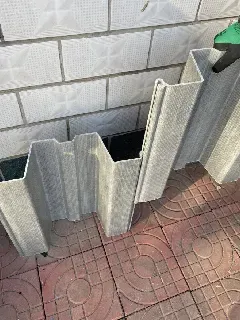loading...
- No. 9, Xingyuan South Street, Dongwaihuan Road, Zaoqiang County, Hengshui, Hebei, China
- admin@zjcomposites.com
- +86 15097380338
- Welcome to visit our website!
Innovative Applications of Fiber-Reinforced Plastic Tanks in Modern Industries and Environmental Solutions
The Advantages of Fibre Reinforced Plastic Tanks
In recent years, the demand for advanced materials in various engineering applications has surged, driven by the need for durability, corrosion resistance, and lightweight solutions. One innovation that has gained significant attention is Fibre Reinforced Plastic (FRP) tanks. These tanks are constructed using a composite material that consists of a polymer matrix reinforced with fibrous materials. This combination results in a product with superior properties for storing various liquids in industrial and commercial settings.
Composition and Manufacturing
Fibre Reinforced Plastic tanks are primarily made of a thermoset resin matrix, often polyester or vinyl ester, combined with reinforcing fibres, typically glass or carbon fibres. The manufacturing process usually involves techniques such as hand lay-up, chop strand, and filament winding. These methods allow for the creation of complex shapes and sizes while ensuring structural integrity.
One of the key advantages of using fibrous reinforcement is the enhanced mechanical strength provided by the fibres. The combination of the resin and the reinforcement material results in a structure that can withstand significant internal pressures and external forces, making it an ideal choice for high-performance applications.
Corrosion Resistance
One of the standout features of FRP tanks is their exceptional resistance to corrosion. Unlike traditional metal tanks, which can degrade rapidly when exposed to aggressive chemicals, FRP tanks resist most acids, bases, and solvents. This is particularly crucial in industries such as chemical processing, water treatment, and waste management, where liquids stored may be highly corrosive. The ability to withstand these harsh environments not only prolongs the lifespan of the tanks but also minimizes the risks of leaks and contamination.
Lightweight and Strong
Another significant advantage of FRP tanks is their lightweight nature. Compared to steel or concrete tanks, FRP tanks can be considerably lighter while still maintaining comparable or even superior strength. This property translates into easier transportation and installation, reducing logistical costs and time. Additionally, the lightweight characteristic helps minimize the structural load on the supporting infrastructure, which is particularly beneficial in locations where foundation limitations exist.
fibre reinforced plastic tanks

Thermal Insulation Properties
Fibre Reinforced Plastic also provides excellent thermal insulation properties. The low thermal conductivity of FRP materials helps maintain the temperatures of stored liquids, which can be particularly beneficial in applications where temperature control is critical. This thermal insulation capability can lead to energy savings, making the overall operation more efficient and sustainable.
Customization and Aesthetics
FRP tanks also offer significant flexibility in design and aesthetics. They can be molded into various shapes and sizes, allowing for customization to meet specific storage requirements. Furthermore, these tanks can be manufactured in a range of colors and finishes, making them suitable for various environments without compromising their functional integrity. This feature is particularly appealing for businesses concerned about the visual impact of their storage solutions on premises.
Environmental Considerations
As industries increasingly focus on sustainability, FRP tanks present an eco-friendly option. They can be produced with recyclable materials and have a long service life, reducing the need for frequent replacements. Additionally, their resistance to corrosion and chemical leaching minimizes environmental hazards, promoting safer operations.
Conclusion
Fibre Reinforced Plastic tanks offer a myriad of benefits, making them a wise choice for various applications across different industries. Their durability, corrosion resistance, low weight, thermal insulation properties, and customizable designs position them as superior alternatives to traditional storage solutions. As technology continues to advance, it is likely that the use of FRP tanks will become even more prevalent, propelling innovations in storage solutions while meeting the demands of an ever-evolving industrial landscape. With their myriad advantages, FRP tanks stand as a testament to the potential of composite materials in modern engineering.
-
Transform Your Spaces with FRP Grating SolutionsNewsNov.04,2024
-
The Versatility and Strength of FRP RodsNewsNov.04,2024
-
The Excellence of Fiberglass Water TanksNewsNov.04,2024
-
The Benefits of FRP Grating for Your ProjectsNewsNov.04,2024
-
Elevate Your Efficiency with FRP Pressure VesselsNewsNov.04,2024
-
Welcome to the World of FRP Pressure VesselsNewsOct.12,2024
-
Unveiling the Future of Filtration: Why FRP Filter Vessels are a Game ChangerNewsOct.12,2024
